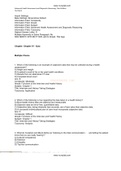Exam (elaborations)
Advanced Health Assessment and Diagnostic Reasoning 4th Edition Rhoads Test Bank
Advanced Health Assessment and Diagnostic Reasoning 4th Edition Rhoads Test Bank
To clarify this is a test bank not a textbook . Test Bank Directly From The publisher, 100% Verified Answers. COVERS ALL CHAPTERS. Download Immediately After the Order. pdf printed . instant delivery .
[Show more]
Preview 4 out of 317 pages
Uploaded on
January 6, 2022
Number of pages
317
Written in
2021/2022
Type
Exam (elaborations)
Contains
Questions & answers
By: alicez • 5 months ago
By: laurayhc • 8 months ago
By: christiann3 • 9 months ago
By: Roadie318 • 11 months ago
By: amberstuckey • 1 year ago
By: esjonamim • 1 year ago
many of the answers to the questions are wrong
By: elijahstephen • 1 year ago
Show more reviews
$27.49
100% satisfaction guarantee
Immediately available after payment
Both online and in PDF
No strings attached
G R A D E S M O R E . C O MAdvanced Health Assessment and Diagnostic Reasoning , Third Edition Test Bank Copyright © 2018 Jones & Bartlett Learning, LLC, as Ascend Learning Company Import Settings: Base Settings: Brownstone Default Information Field: Complexity Information Field: Ahead Information Field: Subject Information Field: Advanced Health Assessment and Diagnostic Reasoning Information Field: Taxonomy Highest Answer Letter: D Multiple Keywords in Same Paragraph: No NAS ISBN13: 9781284171228, add to Ahead, Title tags Chapter: Chapter 01 - Quiz Multiple Choice 1. Which of the following is an example of subjective data that may be collected during a health assessment? A) Height and weight B) A patient’s recall of his or her past health conditions C) Results from an abdominal CT scan D) Complete blood count Ans: B Complexity: Moderate Ahead: Functions of the Interview and Health History Subject: Chapter 1 Title: Interview and History-Taking Strategies Taxonomy: Application 2. Which of the following is true regarding the data taken in a health history? A) Most health history data are objective and measurable. B) Objective data are error-free, quantifiable data. C) Subjective data, being inherently less accurate, are of less value than objective da ta. D) A successful individualized plan of care must incorporate subjective data. Ans: D Complexity: Difficult Ahead: Functions of the Interview and Health History Subject: Chapter 1 Title: Interview and History-Taking Strategies Taxonomy: Analysis 3. What do Coulehan and Block define as “listening to the total communication . . . and letting the patient know that you are really hearing”? A) Cultural competence B) Patience C) Empathy D) Top-tier communication WWW.GRADESMORE.COM




